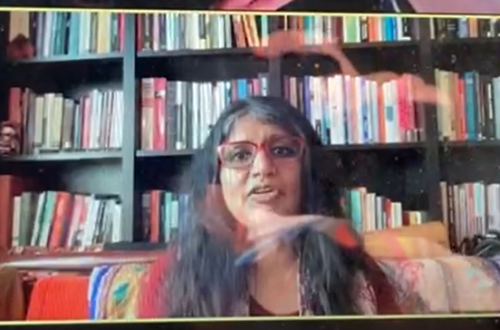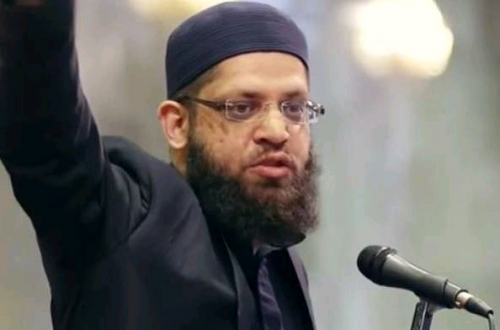This is a cross-post from Joseph Weissman
With news that Stephen Sizer is going to be speaking in Belfast, Northern Ireland next week to show his theological anti-Zionist film With God on our Side, it is worth considering some aspects of Rev Sizer’s approach to political theology.
Both Stephen Sizer and film director Porter Speakman are now claiming they are the victims of unfair criticism. I think, however, it is perfectly fair to hold their political theology up to the light, and examine it as rigorously as they would do to others.
Rev Sizer has a wide range of political allies in the anti-Zionist world. In 2005, he participated in a conference hosted by the IHRC alongside, which featured:
- Hezbollah’s pro-suicide-bombing Rima Fakhry
- pro-terror cleric Achmad Cassiem, whose radio show promotes Holocaust denial
- apocalyptic cleric Mohamed al-Asi, who thinks The End will come when Muslims “deal the deathblow to the Jew”
- pro-terror Greek Orthodox priest Atallah Hanna
- two Neturei Karta rabbis who appear friendly with Holocaust denier Fred Tobin
Of the Christian speakers, there were two who featured mainly.
One was the Reverend Doctor Stephen Sizer PhD:

Rev Sizer was speaking on behalf of Sabeel. He told the conference:
In this short paper I want to present to you a Christian perspective on the right of resistance, within the context of the Palestinian struggle. I want to speak on behalf of Sabeel. They have just produced a new document called “A Non-violent Approach to the Occupation: A call for morally responsible investment”. (Sabeel, Jerusalem, 2005). I would like to present selected parts in this presentation.
Rev Sizer said this in 2005, and allowed his paper to be printed in 2009. In the meantime, Sabeel have described Hamas as a “liberation theology movement.” Rev Sizer, a former vice-chair of Friends of Sabeel UK, remains publicly supportive of Sabeel.
The other Christian speaker was Fr. Joe McVeigh:

Joe McVeigh said at the conference:
Resistance to British occupation has taken many different forms over the years. In Ireland men and women joined the IRA or some other armed group and took up arms to protect their own people and to resist the British occupation of Ireland. They have done so in every generation for centuries. Men and women have gone out and taken on the might of the British Empire. Many have given their lives. Many ended up in jail. Family life was disrupted. The official church -the Bishops- denounced the men of violence meaning the IRA. Their denunciations of violence were one-sided. Some of us engaged in passive resistance.
The message Sizer and McVeigh were sending was very clear: non-violence and “passive resistance” was their way. Meanwhile, they have both made common cause with those in favour in violence.
McVeigh describes Fr Des Wilson as his ‘good friend’ to the IHRC, noting the work McVeigh and Wilson have done together advocating for those they consider to be political prisoners. Des Wilson has offered vocal support and praise for IRA terrorists, lauding former Provisional IRA chief of staff Joe Cahill as a “man of action rather than words.”
Elsewhere, McVeigh has favourably compared the IRA with Hamas, claiming that both terror groups acted as the voice for their people.
McVeigh boasts of being reprimanded by his bishop for preaching a controversial sermon on the Birmingham Six.
He explains that he is simply following liberation theology:
Liberation theology, Joe says, is about “putting the social Gospel of Jesus Christ into practice in situations of oppression and taking the side of the poor. You have to make a choice, you can’t stand neutral. You’re either on the side of the rich or the side of the poor. That, with my own historical experience in the North, showed me that liberation theology was the only way that the church could be authentic in any revolutionary situation.”
What comes across from Fr McVeigh – both at the IHRC conference and in other writings – is the way that he speaks about the national journey of the Irish and Palestinian people.
Fr McVeigh believes in liberation theology, the idea that God works with a national or social group, and carries out his plans to bring them liberation. Rev Sizer speaks in much the same way about the Palestinian people, frequently citing the Sabeel Ecumenical Liberation Theology Center in his arguments.
Clearly, both McVeigh and Sizer have a distorted, narrow theology in which extreme nationalists who commit acts of violent murder can, actually, be seen as liberators with God on their side.
This is the theology that both men appear to promote, when you take into account Sizer’s promotion of Sabeel theology, McVeigh’s theology about the IRA, and both men featuring alongside Islamist supporters of Hamas and Hezbollah in a conference about a “new liberation theology”.
This totally undermines Sizer’s main criticism of the most extreme Christian Zionists – they have a distorted, narrow theology which views extreme murderous nationalists as liberators with God on their side.
If you follow Sizer’s study guide to the film, the message Sizer most wants to get across is that God has moved from an old, one-nation covenant to a new covenant for everyone – without ethnic or national distinctions.
Sizer treats those who believe that God’s covenants work for the Jewish people as heretics.
But then Sizer makes common cause with people who believe in a national theology for the Palestinian or the Irish people.
Essentially, Sizer thinks that God can work with some nations but not others.
This is not the message Northern Ireland needs to hear.


